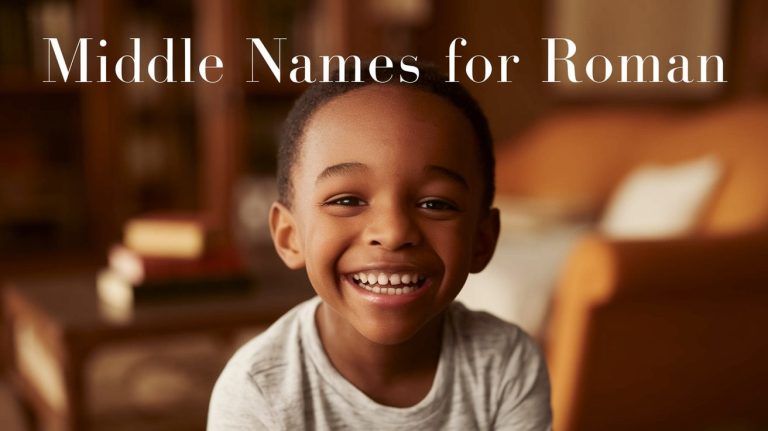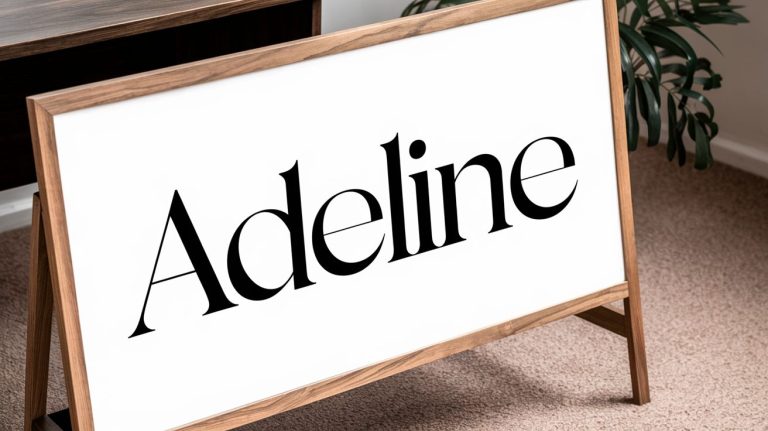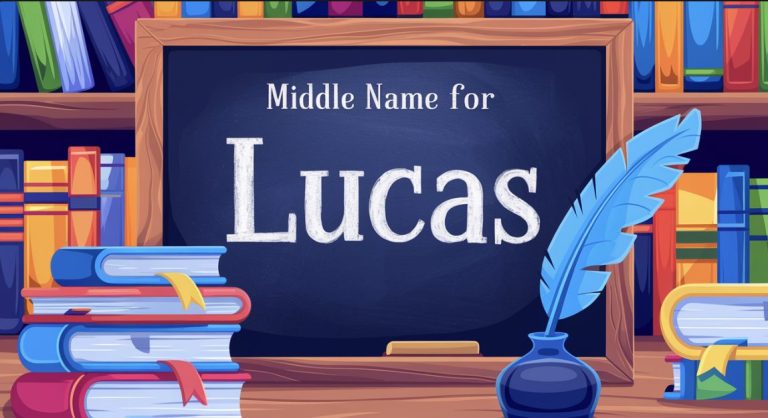Are you expecting a little Mateo soon? Or maybe you’ve already welcomed this special boy into your life? Choosing the right middle name might seem tricky, but it’s also a chance to make your child’s name truly unique.
Middle names do more than just fill space on a birth certificate. They can honor family members, balance out a first name, or add a special meaning to your child’s identity.
For a name like Mateo – smooth, strong, and full of character – you’ll want a middle name that complements its charm.
Significance you’re looking for something traditional, modern, or completely unexpected, the perfect middle name is waiting to be found out.
Classic Middle Name of Mateo

1. Mateo James
-
Origin: Hebrew
-
Pronunciation: JAYMZ
-
Meaning: James means “supplanter”—someone who takes the place of another, often symbolizing strength and leadership.
2. Mateo Alexander
-
Origin: Greek
-
Pronunciation: al-ig-ZAN-dur
-
Meaning: Alexander means “defender of the people” and is known for its royal and heroic flair.
3. Mateo Joseph
-
Origin: Hebrew
-
Pronunciation: JOH-sef
-
Meaning: Joseph means “God will increase” or “He will add,” often tied to blessings and growth.
4. Mateo William
-
Origin: Germanic
-
Pronunciation: WILL-ee-um
-
Meaning: William means “resolute protector” and is a classic royal name.
5. Mateo Thomas
-
Origin: Aramaic
-
Pronunciation: TAH-mas
-
Meaning: Thomas means “twin” and is widely loved for its biblical connection.
6. Mateo Charles
-
Origin: Germanic
-
Pronunciation: CHARLZ
-
Meaning: Charles means “free man” and carries a strong, classic tone.
7. Mateo Daniel
-
Origin: Hebrew
-
Pronunciation: DAN-yul
-
Meaning: Daniel means “God is my judge,” showing wisdom and integrity.
8. Mateo Robert
-
Origin: Germanic
-
Pronunciation: RAH-bert
-
Meaning: Robert means “bright fame” and reflects legacy and honor.
9. Mateo Henry
-
Origin: Germanic
-
Pronunciation: HEN-ree
-
Meaning: Henry means “ruler of the household” and has deep royal roots.
10. Mateo David
-
Origin: Hebrew
-
Pronunciation: DAY-vid
-
Meaning: David means “beloved” and represents kindness and courage.
11. Mateo Samuel
-
Origin: Hebrew
-
Pronunciation: SAM-yoo-uhl
-
Meaning: Samuel means “God has heard” and is often linked to wisdom and spiritual strength.
12. Mateo Paul
-
Origin: Latin
-
Pronunciation: PAWL
-
Meaning: Paul means “small” or “humble” and reflects simplicity with strength.
13. Mateo George
-
Origin: Greek
-
Pronunciation: JORJ
-
Meaning: George means “farmer” or “earth-worker,” symbolizing diligence and steadiness.
14. Mateo Richard
-
Origin: Germanic
-
Pronunciation: RIH-churd
-
Meaning: Richard means “brave ruler,” ideal for someone destined to lead.
15. Mateo Edward
-
Origin: English
-
Pronunciation: ED-werd
-
Meaning: Edward means “wealthy guardian” and evokes loyalty and nobility.
16. Mateo John
-
Origin: Hebrew
-
Pronunciation: JON
-
Meaning: John means “God is gracious,” known for being a gentle, enduring name.
17. Mateo Anthony
-
Origin: Latin
-
Pronunciation: AN-thuh-nee
-
Meaning: Anthony means “priceless one,” often chosen to show value and worth.
18. Mateo Patrick
-
Origin: Latin
-
Pronunciation: PAT-rik
-
Meaning: Patrick means “nobleman” and is deeply tied to Irish heritage and honor.
19. Mateo Louis
-
Origin: French/German
-
Pronunciation: LOO-ee
-
Meaning: Louis means “renowned warrior” and is both regal and bold.
20. Mateo Stephen
-
Origin: Greek
-
Pronunciation: STEE-ven
-
Meaning: Stephen means “crown” or “wreath,” symbolizing victory and honor.
21. Mateo Clark
-
Origin: English
-
Pronunciation: KLARK
-
Meaning: Clark means “scribe” or “scholar” and has an intellectual charm.
22. Mateo Harold
-
Origin: Scandinavian
-
Pronunciation: HAIR-old
-
Meaning: Harold means “army ruler,” a strong name with vintage power.
23. Mateo Arthur
-
Origin: Celtic
-
Pronunciation: AR-thur
-
Meaning: Arthur means “bear king” and brings to mind legends and strength.
24. Mateo Ernest
-
Origin: Germanic
-
Pronunciation: UR-nest
-
Meaning: Ernest means “serious” or “resolute,” perfect for a dependable spirit.
25. Mateo Alfred
-
Origin: English
-
Pronunciation: AL-fred
-
Meaning: Alfred means “wise counselor,” associated with intelligence and peace.
26. Mateo Bernard
-
Origin: Germanic
-
Pronunciation: BUR-nard
-
Meaning: Bernard means “brave as a bear,” linking boldness with kindness.
27. Mateo Vincent
-
Origin: Latin
-
Pronunciation: VIN-sent
-
Meaning: Vincent means “conquering” or “to win,” ideal for a strong soul.
28. Mateo Edwin
-
Origin: English
-
Pronunciation: ED-win
-
Meaning: Edwin means “rich friend,” showing loyalty, success, and charm.
Trendy & Modern Middle Names for Mateo!
29. Mateo Jace
-
Origin: American
-
Pronunciation: JAYS
-
Meaning: Jace means “healer” and brings a cool, modern vibe to the name.
30. Mateo Axel
-
Origin: Scandinavian
-
Pronunciation: AK-sel
-
Meaning: Axel means “father of peace” and gives off edgy yet peaceful energy.
31. Mateo Cruz
-
Origin: Spanish
-
Pronunciation: KROOZ
-
Meaning: Cruz means “cross” and reflects spiritual strength and simplicity.
32. Mateo Zane
-
Origin: Hebrew
-
Pronunciation: ZAYN
-
Meaning: Zane means “God is gracious” and feels sleek and modern.
33. Mateo Jett
-
Origin: English
-
Pronunciation: JET
-
Meaning: Jett means “black gemstone” and has a fast, cool-sounding tone.
34. Mateo Kai
-
Origin: Hawaiian
-
Pronunciation: KYE
-
Meaning: Kai means “sea” and evokes calmness and nature.
35. Mateo Knox
-
Origin: Scottish
-
Pronunciation: NOKS
-
Meaning: Knox means “round hill,” giving off rugged, adventurous energy.
36. Mateo Nash
-
Origin: English
-
Pronunciation: NASH
-
Meaning: Nash means “by the ash tree” and feels sleek and stylish.
37. Mateo Blaze
-
Origin: Latin
-
Pronunciation: BLAYZ
-
Meaning: Blaze means “fire” and radiates boldness and energy.
38. Mateo Kian
-
Origin: Irish
-
Pronunciation: KEE-an
-
Meaning: Kian means “ancient” or “grace of God,” modern yet meaningful.
39. Mateo Jaxon
-
Origin: American
-
Pronunciation: JAK-sen
-
Meaning: Jaxon is a modern take on Jackson, meaning “son of Jack.”
40. Mateo Zayn
-
Origin: Arabic
-
Pronunciation: ZAYN
-
Meaning: Zayn means “beauty” or “grace” and carries a sleek flair.
41. Mateo Milo
-
Origin: Germanic
-
Pronunciation: MY-loh
-
Meaning: Milo means “soldier” or “merciful,” soft and strong at once.
42. Mateo Finn
-
Origin: Irish
-
Pronunciation: FIN
-
Meaning: Finn means “fair” or “white,” and adds a gentle charm.
43. Mateo Beckham
-
Origin: English
-
Pronunciation: BEK-um
-
Meaning: Beckham means “homestead by the stream,” and gives a sporty edge.
44. Mateo Luca
-
Origin: Italian
-
Pronunciation: LOO-kah
-
Meaning: Luca means “bringer of light” and complements Mateo perfectly.
45. Mateo Bodhi
-
Origin: Sanskrit
-
Pronunciation: BOH-dee
-
Meaning: Bodhi means “awakening” or “enlightenment” in a spiritual sense.
46. Mateo Phoenix
-
Origin: Greek
-
Pronunciation: FEE-niks
-
Meaning: Phoenix symbolizes rebirth and resilience through the mythic firebird.
47. Mateo Easton
-
Origin: English
-
Pronunciation: EES-tun
-
Meaning: Easton means “east-facing place,” blending trendiness with nature.
48. Mateo Greyson
-
Origin: English
-
Pronunciation: GRAY-sen
-
Meaning: Greyson means “son of the steward” and gives off modern class.
49. Mateo Aiden
-
Origin: Irish
-
Pronunciation: AY-den
-
Meaning: Aiden means “little fire” and brings warmth and modern energy.
50. Mateo Ryder
-
Origin: English
-
Pronunciation: RY-dur
-
Meaning: Ryder means “horseman” or “messenger,” bold and adventurous.
51. Mateo Lennox
-
Origin: Scottish
-
Pronunciation: LEN-ox
-
Meaning: Lennox means “elm grove” and feels noble and stylish.
52. Mateo Kairo
-
Origin: Arabic
-
Pronunciation: KYE-roh
-
Meaning: Kairo is a modern spelling of Cairo, symbolizing strength and history.
53. Mateo Zeke
-
Origin: Hebrew
-
Pronunciation: ZEEK
-
Meaning: Zeke is short for Ezekiel, meaning “God strengthens.”
54. Mateo Cruzian
-
Origin: Modern (Invented)
-
Pronunciation: KROO-zee-an
-
Meaning: Cruzian blends the idea of “cross” with uniqueness and style.
55. Mateo Koda
-
Origin: Native American
-
Pronunciation: KOH-dah
-
Meaning: Koda means “friend” or “companion,” giving warm and gentle vibes.
56. Mateo Maddox
-
Origin: Welsh
-
Pronunciation: MAD-ox
-
Meaning: Maddox means “son of Madoc,” known for strength and individuality.
Short & Cute Middle Names for Mateo
57. Mateo Eli
-
Origin: Hebrew
-
Pronunciation: EE-lye
-
Meaning: Eli means “ascended” or “my God,” short yet deeply spiritual.
58. Mateo Leo
-
Origin: Latin
-
Pronunciation: LEE-oh
-
Meaning: Leo means “lion” and symbolizes courage and leadership.
59. Mateo Ray
-
Origin: English
-
Pronunciation: RAY
-
Meaning: Ray means “beam of light,” simple and full of brightness.
60. Mateo Max
-
Origin: Latin
-
Pronunciation: MAKS
-
Meaning: Max means “greatest,” bold and packed with power in just three letters.
61. Mateo Ben
-
Origin: Hebrew
-
Pronunciation: BEN
-
Meaning: Ben means “son” and is sweet, classic, and universally loved.
62. Mateo Jay
-
Origin: English
-
Pronunciation: JAY
-
Meaning: Jay is linked to the jaybird and often symbolizes vibrance and curiosity.
63. Mateo Lee
-
Origin: English
-
Pronunciation: LEE
-
Meaning: Lee means “meadow” and gives peaceful, nature-loving energy.
64. Mateo Cole
-
Origin: English
-
Pronunciation: KOHL
-
Meaning: Cole means “charcoal” or “dark,” smooth and sleek in sound.
65. Mateo Sam
-
Origin: Hebrew
-
Pronunciation: SAM
-
Meaning: Sam is short for Samuel, meaning “God has heard.”
66. Mateo Beau
-
Origin: French
-
Pronunciation: BOH
-
Meaning: Beau means “handsome” and brings a charming, romantic feel.
67. Mateo Jude
-
Origin: Hebrew
-
Pronunciation: JOOD
-
Meaning: Jude means “praised” and is both simple and classic.
68. Mateo Drew
-
Origin: Greek
-
Pronunciation: DROO
-
Meaning: Drew means “manly” or “brave,” short and strong.
69. Mateo Ezra
-
Origin: Hebrew
-
Pronunciation: ZEEK
-
Meaning: Zeke means “God strengthens” and is energetic and fun.
70. Mateo Tate
-
Origin: English
-
Pronunciation: TAYT
-
Meaning: Tate means “cheerful,” bringing happy, upbeat energy.
71. Mateo Dean
-
Origin: English
-
Pronunciation: DEEN
-
Meaning: Dean means “valley” or “leader,” and gives calm strength.
72. Mateo Rhys
-
Origin: Welsh
-
Pronunciation: REES
-
Meaning: Rhys means “enthusiasm” or “passion,” both stylish and meaningful.
73. Mateo Reid
-
Origin: Scottish
-
Pronunciation: REED
-
Meaning: Reid means “red-haired” and carries a sharp, crisp sound.
74. Mateo Neil
-
Origin: Irish
-
Pronunciation: NEEL
-
Meaning: Neil means “champion” and is strong, short, and classic.
75. Mateo Río
-
Origin: Hawaiian
-
Pronunciation: KYE
-
Meaning: Kai means “sea” and offers a calming, cool vibe.
76. Mateo Gus
-
Origin: Latin
-
Pronunciation: GUHS
-
Meaning: Gus means “great” or “magnificent,” short and retro-cute.
77. Mateo Wes
-
Origin: English
-
Pronunciation: WESS
-
Meaning: Wes means “western meadow” and is relaxed and friendly.
78. Mateo Eliam
-
Origin: Hebrew
-
Pronunciation: EE-lee-um
-
Meaning: Eliam means “God is my nation” and is both rare and strong.
79. Mateo Oz
-
Origin: Hebrew
-
Pronunciation: AHZ
-
Meaning: Oz means “strength” and has bold style with just two letters.
80. Mateo Lev
-
Origin: Hebrew
-
Pronunciation: LEV
-
Meaning: Lev means “heart” and brings a gentle, loving tone.
81. Mateo Bo
-
Origin: Scandinavian
-
Pronunciation: BOH
-
Meaning: Bo means “to live” and gives cool, minimalist vibes.
82. Mateo Fox
-
Origin: English
-
Pronunciation: FAHKS
-
Meaning: Fox symbolizes cleverness and style, nature-inspired and bold.
83. Mateo Pax
-
Origin: Spanish
-
Pronunciation: KROOZ
-
Meaning: Cruz means “cross” and blends faith and trend effortlessly.
84. Mateo Rio
-
Origin: Spanish
-
Pronunciation: REE-oh
-
Meaning: Rio means “river” and carries fresh, flowing charm.
Nature-Inspired Middle Names for Mateo
85. Mateo River
-
Origin: English
-
Pronunciation: RIV-er
-
Meaning: River symbolizes flow, freedom, and calm natural energy.
86. Mateo Sage
-
Origin: Latin
-
Pronunciation: SAYJ
-
Meaning: Sage means “wise one” and also refers to a healing herb.
87. Mateo Forest
-
Origin: French
-
Pronunciation: FOR-ist
-
Meaning: Forest brings the sense of lush woods and peaceful wildness.
88. Mateo Ocean
-
Origin: Greek
-
Pronunciation: OH-shun
-
Meaning: Ocean symbolizes vastness, strength, and serenity.
89. Mateo Stone
-
Origin: English
-
Pronunciation: STOHN
-
Meaning: Stone represents stability, strength, and groundedness.
90. Mateo Sky
-
Origin: English
-
Pronunciation: SKYE
-
Meaning: Sky evokes openness, peace, and boundless beauty.
91. Mateo Rain
-
Origin: English
-
Pronunciation: RAYN
-
Meaning: Rain is fresh and gentle, symbolizing renewal and life.
92. Mateo Wolf
-
Origin: Germanic
-
Pronunciation: WUHLF
-
Meaning: Wolf represents loyalty, instinct, and wilderness.
93. Mateo Cedar
-
Origin: English
-
Pronunciation: SEE-dur
-
Meaning: Cedar is a strong tree symbolizing protection and resilience.
94. Mateo Ash
-
Origin: English
-
Pronunciation: ASH
-
Meaning: Ash refers to the ash tree and symbolizes growth through regeneration.
95. Mateo Flint
-
Origin: English
-
Pronunciation: FLINT
-
Meaning: Flint is a hard rock symbolizing spark, fire, and toughness.
96. Mateo Raven
-
Origin: English
-
Pronunciation: FAHKS
-
Meaning: Fox symbolizes cleverness, agility, and natural charm.
97. Mateo Leaf
-
Origin: English
-
Pronunciation: LEEF
-
Meaning: Leaf reflects nature, growth, and new beginnings.
98. Mateo Canyon
-
Origin: Spanish
-
Pronunciation: KAN-yun
-
Meaning: Canyon suggests grandeur and strength carved by time and nature.
99. Mateo Storm
-
Origin: English
-
Pronunciation: STORM
-
Meaning: Storm symbolizes power, change, and dramatic energy.
100. Mateo Hawk
-
Origin: English
-
Pronunciation: HAWK
-
Meaning: Hawk represents vision, freedom, and sharp intelligence.
101. Mateo Lake
-
Origin: English
-
Pronunciation: LAYK
-
Meaning: Lake evokes stillness, peace, and natural beauty.
102. Mateo Pine
-
Origin: English
-
Pronunciation: PYN
-
Meaning: Pine symbolizes endurance, longevity, and connection to nature.
103. Mateo Bear
-
Origin: English
-
Pronunciation: BAIR
-
Meaning: Bear stands for strength, courage, and protection.
104. Mateo Orion
-
Origin: Greek
-
Pronunciation: oh-RYE-un
-
Meaning: Orion is a starry name representing a mighty hunter in mythology.
105. Mateo Everest
-
Origin: English
-
Pronunciation: EV-er-ist
-
Meaning: Everest symbolizes the highest peak, ambition, and greatness.
106. Mateo Bay
-
Origin: English
-
Pronunciation: BAY
-
Meaning: Bay reflects peaceful coastal waters and a gentle spirit.
107. Mateo Grove
-
Origin: English
-
Pronunciation: GROHV
-
Meaning: Grove means a small forest, symbolizing calmness and life.
108. Mateo Flinton
-
Origin: English (Modern blend)
-
Pronunciation: FLIN-tun
-
Meaning: Flinton evokes rugged strength and earthy charm.
109. Mateo Briar
-
Origin: English
-
Pronunciation: BRY-er
-
Meaning: Briar means thorny bush, symbolizing resilience and beauty.
110. Mateo Canyon
-
Origin: Spanish
-
Pronunciation: KAN-yun
-
Meaning: Canyon signifies deep natural wonder and strength.
111. Mateo Sol
-
Origin: Spanish
-
Pronunciation: SOHL
-
Meaning: Sol means “sun” and brings warmth, brightness, and joy
112. Mateo Cliff
-
Origin: English
-
Pronunciation: KLIF
-
Meaning: Cliff symbolizes bold edges, adventure, and scenic power.
International & Cultural Middle Names for Mateo
113. Mateo Diego
-
Origin: Spanish
-
Pronunciation: dee-AY-go
-
Meaning: Diego means “supplanter,” a Spanish form of James with bold charm.
114. Mateo Rafael
-
Origin: Hebrew/Spanish
-
Pronunciation: rah-fah-EL
-
Meaning: Rafael means “God has healed,” symbolizing grace and protection.
115. Mateo Hugo
-
Origin: Germanic
-
Pronunciation: HOO-go
-
Meaning: Hugo means “mind” or “intellect,” ideal for thoughtful souls.
116. Mateo Elias
-
Origin: Hebrew
-
Pronunciation: ee-LYE-us
-
Meaning: Elias means “Yahweh is my God,” with biblical depth and style.
117. Mateo Luis
-
Origin: Spanish
-
Pronunciation: loo-EES
-
Meaning: Luis means “famous warrior” and adds strength with flair.
118. Mateo Santiago
-
Origin: Spanish
-
Pronunciation: san-TYAH-go
-
Meaning: Santiago means “Saint James” and is deeply rooted in heritage.
119. Mateo Javier
-
Origin: Spanish
-
Pronunciation: hah-vee-AIR
-
Meaning: Javier means “new house” or “bright” and is bold and classic.
120. Mateo Bruno
-
Origin: Germanic
-
Pronunciation: BROO-no
-
Meaning: Bruno means “brown” or “armor,” with a grounded, warm tone.
121. Mateo Enzo
-
Origin: Italian
-
Pronunciation: EN-zoh
-
Meaning: Enzo means “ruler of the household” and blends cool and classic.
122. Mateo Paulo
-
Origin: Portuguese
-
Pronunciation: POW-loo
-
Meaning: Paulo means “small” or “humble,” a refined and faithful choice.
123. Mateo Marco
-
Origin: Italian
-
Pronunciation: MAR-ko
-
Meaning: Marco means “warlike” and is bold with ancient Roman charm.
124. Mateo Andrés
-
Origin: Spanish
-
Pronunciation: ahn-DRESS
-
Meaning: Andrés means “manly” or “brave,” full of courage and tradition.
125. Mateo Thiago
-
Origin: Portuguese
-
Pronunciation: tee-AH-go
-
Meaning: Thiago means “supplanter,” a vibrant, international favorite.
126. Mateo León
-
Origin: Spanish
-
Pronunciation: lay-OWN
-
Meaning: León means “lion,” symbolizing strength and leadership.
127. Mateo Emilio
-
Origin: Spanish/Italian
-
Pronunciation: eh-MEE-lee-oh
-
Meaning: Emilio means “rival” or “eager,” full of passion and elegance.
128. Mateo Carlos
-
Origin: Spanish
-
Pronunciation: KAR-los
-
Meaning: Carlos means “free man,” a powerful and popular Latin choice.
129. Mateo Alonso
-
Origin: Spanish
-
Pronunciation: ah-LON-soh
-
Meaning: Alonso means “ready for battle,” strong and classic.
130. Mateo Martín
-
Origin: Spanish
-
Pronunciation: mar-TEEN
-
Meaning: Martín means “of Mars” (god of war), symbolizing boldness.
131. Mateo Joaquin
-
Origin: Spanish
-
Pronunciation: wah-keen
-
Meaning: Joaquin means “God will judge,” traditional yet cool and modern.
132. Mateo Francisco
-
Origin: Spanish
-
Pronunciation: fran-SEES-koh
-
Meaning: Francisco means “free man” and brings warmth and spiritual strength.
133. Mateo Sergio
-
Origin: Latin/Spanish
-
Pronunciation: SER-hee-oh
-
Meaning: Sergio means “servant” or “protector,” noble and refined.
134. Mateo Raul
-
Origin: Spanish
-
Pronunciation: rah-OOL
-
Meaning: Raul means “wise wolf,” evoking loyalty and strength.
135. Mateo Iker
-
Origin: Basque
-
Pronunciation: EE-ker
-
Meaning: Iker means “visitation,” rare and full of spiritual depth.
136. Mateo Pablo
-
Origin: Spanish
-
Pronunciation: PAH-bloh
-
Meaning: Pablo means “small” or “humble,” simple and classic.
137. Mateo Gael
-
Origin: Breton/Spanish
-
Pronunciation: gah-EL
-
Meaning: Gael means “joyful” or “generous spirit,” short and sweet.
138. Mateo Fernando
-
Origin: Spanish
-
Pronunciation: fer-NAHN-doh
-
Meaning: Fernando means “brave path,” strong and noble in sound.
139. Mateo Esteban
-
Origin: Spanish
-
Pronunciation: es-TEH-bahn
-
Meaning: Esteban means “crown,” reflecting honor and achievement.
140. Mateo Luciano
-
Origin: Latin/Italian
-
Pronunciation: loo-chee-AH-no
-
Meaning: Luciano means “light,” perfect for a bright, glowing soul.
Biblical Middle Names for Mateo
141. Mateo Abel
-
Origin: Hebrew
-
Pronunciation: AY-bul
-
Meaning: Abel means “breath” or “vapor,” symbolizing innocence and fleeting beauty.
142. Mateo Asher
-
Origin: Hebrew
-
Pronunciation: ASH-er
-
Meaning: Asher means “happy” or “blessed,” bringing joy and positivity.
143. Mateo Caleb
-
Origin: Hebrew
-
Pronunciation: KAY-leb
-
Meaning: Caleb means “whole-hearted” or “faithful,” reflecting loyalty and courage.
144. Mateo Levi
-
Origin: Hebrew
-
Pronunciation: LEE-vye
-
Meaning: Levi means “joined” or “attached,” symbolizing unity and connection.
145. Mateo Isaac
-
Origin: Hebrew
-
Pronunciation: EYE-zik
-
Meaning: Isaac means “laughter,” often representing joy and divine promise.
146. Mateo Jacob
-
Origin: Hebrew
-
Pronunciation: JAY-kub
-
Meaning: Jacob means “supplanter,” tied to strength and legacy.
147. Mateo Jonah
-
Origin: Hebrew
-
Pronunciation: JOH-nuh
-
Meaning: Jonah means “dove,” a symbol of peace and hope.
148. Mateo Ezekiel
-
Origin: Hebrew
-
Pronunciation: eh-ZEE-kee-uhl
-
Meaning: Ezekiel means “God strengthens,” expressing spiritual power.
149. Mateo Micah
-
Origin: Hebrew
-
Pronunciation: MY-kuh
-
Meaning: Micah means “who is like God?”—a name of humility and wonder.
150. Mateo Malachi
-
Origin: Hebrew
-
Pronunciation: MAL-uh-kye
-
Meaning: Malachi means “messenger of God,” a name full of purpose.
151. Mateo Noah
-
Origin: Hebrew
-
Pronunciation: NOH-uh
-
Meaning: Noah means “rest” or “comfort,” symbolizing peace and new beginnings.
152. Mateo Silas
-
Origin: Latin
-
Pronunciation: SY-lus
-
Meaning: Silas means “wood” or “forest,” often tied to strength and grace.
153. Mateo Ezra
-
Origin: Hebrew
-
Pronunciation: EZ-ruh
-
Meaning: Ezra means “helper” or “protector,” gentle and wise.
154. Mateo Joel
-
Origin: Hebrew
-
Pronunciation: JOH-uhl
-
Meaning: Joel means “Yahweh is God,” representing devotion and strength.
155. Mateo Nathaniel
-
Origin: Hebrew
-
Pronunciation: nuh-THAN-yuhl
-
Meaning: Nathaniel means “gift of God,” a classic full of grace.
156. Mateo Benjamin
-
Origin: Hebrew
-
Pronunciation: BEN-juh-min
-
Meaning: Benjamin means “son of the right hand,” symbolizing favor and strength.
157. Mateo Gabriel
-
Origin: Hebrew
-
Pronunciation: GAY-bree-uhl
-
Meaning: Gabriel means “God is my strength,” a name of protection and light.
158. Mateo Elian
-
Origin: Hebrew/Spanish
-
Pronunciation: EH-lee-ahn
-
Meaning: Elian means “God has answered,” both gentle and strong.
159. Mateo Zion
-
Origin: Hebrew
-
Pronunciation: ZYE-un
-
Meaning: Zion means “highest point,” a spiritual name tied to heaven and peace.
160. Mateo Elias
-
Origin: Hebrew
-
Pronunciation: ee-LYE-us
-
Meaning: Elias means “the Lord is my God,” traditional yet vibrant.
161. Mateo Reuben
-
Origin: Hebrew
-
Pronunciation: ROO-ben
-
Meaning: Reuben means “behold, a son,” expressing joy and family pride.
162. Mateo Amos
-
Origin: Hebrew
-
Pronunciation: AY-mus
-
Meaning: Amos means “carried by God,” a strong, prophetic name.
163. Mateo Tobias
-
Origin: Hebrew
-
Pronunciation: toe-BYE-us
-
Meaning: Tobias means “God is good,” cheerful and comforting.
164. Mateo Josiah
-
Origin: Hebrew
-
Pronunciation: joh-SYE-uh
-
Meaning: Josiah means “God supports,” both bold and spiritual.
165. Mateo Eli
-
Origin: Hebrew
-
Pronunciation: EE-lye
-
Meaning: Eli means “ascended” or “my God,” short and meaningful.
166. Mateo Emmanuel
-
Origin: Hebrew
-
Pronunciation: eh-MAN-yoo-el
-
Meaning: Emmanuel means “God is with us,” a powerful biblical name.
167. Mateo Gideon
-
Origin: Hebrew
-
Pronunciation: GID-ee-un
-
Meaning: Gideon means “mighty warrior,” brave and wise.
168. Mateo Jesse
-
Origin: Hebrew
-
Pronunciation: JESS-ee
-
Meaning: Jesse means “gift” and is tied to King David’s lineage.
Rare & Unique Middle Names for Mateo
169. Mateo Onyx
-
Origin: Greek
-
Pronunciation: ON-iks
-
Meaning: Onyx is a black gemstone symbolizing strength and grounding energy.
170. Mateo Zephyr
-
Origin: Greek
-
Pronunciation: ZEF-er
-
Meaning: Zephyr means “west wind,” gentle and full of fresh beginnings.
171. Mateo Quill
-
Origin: English
-
Pronunciation: KWIL
-
Meaning: Quill symbolizes creativity and expression, like a writer’s pen.
172. Mateo Bane
-
Origin: Slavic
-
Pronunciation: BAYN
-
Meaning: Bane means “glorious defender,” rare with a bold edge.
173. Mateo Vero
-
Origin: Latin
-
Pronunciation: VEH-roh
-
Meaning: Vero means “truth,” simple yet powerfully honest.
174. Mateo Indigo
-
Origin: Greek
-
Pronunciation: IN-dih-go
-
Meaning: Indigo is a deep color name representing mystery and intuition.
175. Mateo Aero
-
Origin: Greek
-
Pronunciation: AIR-oh
-
Meaning: Aero means “of the air,” light, unique, and breezy.
176. Mateo Zen
-
Origin: Japanese
-
Pronunciation: ZEN
-
Meaning: Zen symbolizes peace, calm, and mindfulness.
177. Mateo Echo
-
Origin: Greek
-
Pronunciation: EH-koh
-
Meaning: Echo means “reflected sound,” mystical and poetic in nature.
178. Mateo Vale
-
Origin: Latin
-
Pronunciation: VAYL
-
Meaning: Vale means “valley,” serene and softly grounded.
179. Mateo Calyx
-
Origin: Greek
-
Pronunciation: KAY-liks
-
Meaning: Calyx is the outer part of a flower, symbolizing hidden beauty.
180. Mateo Brio
-
Origin: Italian
-
Pronunciation: BREE-oh
-
Meaning: Brio means “vigor” or “energy,” cheerful and full of life.
181. Mateo Quest
-
Origin: English
-
Pronunciation: KWEST
-
Meaning: Quest means “a path or mission,” adventurous and bold.
182. Mateo Solace
-
Origin: Latin
-
Pronunciation: SOH-lis
-
Meaning: Solace means “comfort,” calm and nurturing in tone.
183. Mateo Lux
-
Origin: Latin
-
Pronunciation: LUKS
-
Meaning: Lux means “light,” short and shining with clarity.
184. Mateo Rune
-
Origin: Norse
-
Pronunciation: ROON
-
Meaning: Rune means “secret” or “mystery,” magical and ancient.
185. Mateo Fenn
-
Origin: English
-
Pronunciation: FEN
-
Meaning: Fenn means “marshland,” rare and connected to earth and nature.
186. Mateo Cove
-
Origin: English
-
Pronunciation: KOHV
-
Meaning: Cove means “small bay,” quiet and ocean-inspired.
187. Mateo Elio
-
Origin: Italian/Spanish
-
Pronunciation: EH-lee-oh
-
Meaning: Elio means “sun,” warm, bright, and radiant.
188. Mateo Halo
-
Origin: Greek
-
Pronunciation: HAY-loh
-
Meaning: Halo means “circle of light,” pure and angelic in feel.
189. Mateo Lyric
-
Origin: Greek
-
Pronunciation: LIH-rik
-
Meaning: Lyric means “song-like,” musical and expressive.
190. Mateo Drift
-
Origin: English
-
Pronunciation: DRIFT
-
Meaning: Drift symbolizes movement and peaceful flow through life.
191. Mateo Frost
-
Origin: English
-
Pronunciation: FRAWST
-
Meaning: Frost evokes coolness, winter, and fresh clarity.
192. Mateo Arrow
-
Origin: English
-
Pronunciation: AIR-oh
-
Meaning: Arrow symbolizes direction, speed, and purpose.
193. Mateo Briar
-
Origin: English
-
Pronunciation: BRY-er
-
Meaning: Briar is a thorny plant, symbolizing protection and quiet strength.
194. Mateo Cove
-
Origin: English
-
Pronunciation: KOHV
-
Meaning: Cove brings feelings of safety, seclusion, and sea-inspired peace.
195. Mateo Elan
-
Origin: Hebrew
-
Pronunciation: eh-LAHN
-
Meaning: Elan means “tree” or “strong,” a nature-rich, grounded name.
196. Mateo Queston
-
Origin: Modern (Invented)
-
Pronunciation: KWEHS-tun
-
Meaning: Queston blends “quest” with a noble tone, evoking mystery and depth.
Vintage Middle Names for Mateo
197. Mateo Clark
-
Origin: English
-
Pronunciation: KLARK
-
Meaning: Clark means “scribe” or “scholar,” evoking intelligence and old-school charm.
198. Mateo Harold
-
Origin: Scandinavian
-
Pronunciation: HAIR-old
-
Meaning: Harold means “army ruler,” strong, vintage, and stately.
199. Mateo Arthur
-
Origin: Celtic
-
Pronunciation: AR-thur
-
Meaning: Arthur means “bear king,” a legendary name full of strength and wisdom.
200. Mateo Ernest
-
Origin: Germanic
-
Pronunciation: UR-nest
-
Meaning: Ernest means “serious” or “determined,” a name rooted in honor.
201. Mateo Alfred
-
Origin: English
-
Pronunciation: AL-fred
-
Meaning: Alfred means “wise counselor,” classic and noble with a vintage feel.
202. Mateo Bernard
-
Origin: Germanic
-
Pronunciation: BUR-nard
-
Meaning: Bernard means “brave as a bear,” strong and classic.
203. Mateo Vincent
-
Origin: Latin
-
Pronunciation: VIN-sent
-
Meaning: Vincent means “conquering,” bold and full of victory.
204. Mateo Edwin
-
Origin: English
-
Pronunciation: ED-win
-
Meaning: Edwin means “rich friend,” warm, gentle, and dependable.
205. Mateo Ralph
-
Origin: English
-
Pronunciation: RALF
-
Meaning: Ralph means “wolf counsel,” fierce and intellectual.
206. Mateo Walter
-
Origin: Germanic
-
Pronunciation: WAL-ter
-
Meaning: Walter means “ruler of the army,” solid and brave.
207. Mateo Clyde
-
Origin: Scottish
-
Pronunciation: KLYDE
-
Meaning: Clyde means “warm” or “friendly,” vintage and soft-spoken.
208. Mateo Harvey
-
Origin: French
-
Pronunciation: HAR-vee
-
Meaning: Harvey means “battle worthy,” strong with retro charm.
209. Mateo Franklin
-
Origin: English
-
Pronunciation: FRANK-lin
-
Meaning: Franklin means “free man,” old-fashioned and dignified.
210. Mateo Eugene
-
Origin: Greek
-
Pronunciation: yoo-JEEN
-
Meaning: Eugene means “well-born” or “noble,” classic and refined.
211. Mateo Howard
-
Origin: English
-
Pronunciation: HOW-urd
-
Meaning: Howard means “brave heart,” regal and sturdy in tone.
212. Mateo Lester
-
Origin: English
-
Pronunciation: LES-tur
-
Meaning: Lester means “fortified place,” strong and subtly elegant.
213. Mateo Cecil
-
Origin: Latin
-
Pronunciation: SEE-sil
-
Meaning: Cecil means “blind,” but is often used to represent humility and thoughtfulness.
214. Mateo Irving
-
Origin: Scottish
-
Pronunciation: UR-ving
-
Meaning: Irving means “green river” or “fresh water,” vintage and nature-inspired.
215. Mateo Clarence
-
Origin: Latin
-
Pronunciation: KLAIR-ens
-
Meaning: Clarence means “bright” or “clear,” an old-world name with a graceful touch.
216. Mateo Albert
-
Origin: Germanic
-
Pronunciation: AL-burt
-
Meaning: Albert means “noble and bright,” full of strength and dignity.
217. Mateo Stanley
-
Origin: English
-
Pronunciation: STAN-lee
-
Meaning: Stanley means “stone clearing,” vintage and grounded in nature.
218. Mateo Floyd
-
Origin: Welsh
-
Pronunciation: FLOID
-
Meaning: Floyd means “gray-haired,” a rare and stately name.
219. Mateo Amos
-
Origin: Hebrew
-
Pronunciation: AY-mus
-
Meaning: Amos means “carried by God,” a strong biblical classic.
220. Mateo Horace
-
Origin: Latin
-
Pronunciation: HOR-iss
-
Meaning: Horace means “timekeeper,” a wise and poetic vintage choice.
221. Mateo Milton
-
Origin: English
-
Pronunciation: MIL-ton
-
Meaning: Milton means “mill town,” creative and literary in feel.
222. Mateo Orville
-
Origin: French
-
Pronunciation: OR-vil
-
Meaning: Orville means “gold town,” old-fashioned with a charming ring.
223. Mateo Reginald
-
Origin: Latin
-
Pronunciation: REJ-uh-nuld
-
Meaning: Reginald means “king’s advisor,” noble and rare.
224. Mateo Wilbur
-
Origin: Germanic
-
Pronunciation: WILL-bur
-
Meaning: Wilbur means “resolute or brilliant,” a gentle and unique vintage gem.
Celebrity-Inspired Middle Names for Mateo
225. Mateo Leo
-
Origin: Latin
-
Pronunciation: LEE-oh
-
Meaning: Leo means “lion,” symbolizing strength and charm—like Leonardo DiCaprio.
226. Mateo Jude
-
Origin: Hebrew
-
Pronunciation: JOOD
-
Meaning: Jude means “praised,” sleek and stylish like actor Jude Law.
227. Mateo Ashton
-
Origin: English
-
Pronunciation: ASH-tun
-
Meaning: Ashton means “ash tree town,” popularized by Ashton Kutcher.
228. Mateo Idris
-
Origin: Arabic/Welsh
-
Pronunciation: ID-ris
-
Meaning: Idris means “interpreter” or “studious,” made famous by Idris Elba.
229. Mateo Orlando
-
Origin: Italian
-
Pronunciation: or-LAN-doh
-
Meaning: Orlando means “famous land,” linked to actor Orlando Bloom.
230. Mateo Denzel
-
Origin: Cornish
-
Pronunciation: DEN-zul
-
Meaning: Denzel means “from the high stronghold,” a bold name like Denzel Washington.
231. Mateo Ryan
-
Origin: Irish
-
Pronunciation: RYE-an
-
Meaning: Ryan means “little king,” cool and classic like Ryan Gosling.
232. Mateo Keanu
-
Origin: Hawaiian
-
Pronunciation: kee-AH-noo
-
Meaning: Keanu means “cool breeze,” soft and soulful like Keanu Reeves.
233. Mateo Brad
-
Origin: English
-
Pronunciation: BRAD
-
Meaning: Brad means “broad clearing,” a rugged name made famous by Brad Pitt.
234. Mateo Cruise
-
Origin: English
-
Pronunciation: KROOZ
-
Meaning: Cruise evokes adventure and style, made iconic by Tom Cruise.
235. Mateo Chris
-
Origin: Greek
-
Pronunciation: KRIS
-
Meaning: Chris means “follower of Christ,” beloved by fans of Chris Evans and other Hollywood stars.
236. Mateo Joaquin
-
Origin: Spanish
-
Pronunciation: wah-KEEN
-
Meaning: Joaquin means “God will judge,” distinctive like Joaquin Phoenix.
237. Mateo Zayn
-
Origin: Arabic
-
Pronunciation: ZAYN
-
Meaning: Zayn means “beauty” or “grace,” made popular by singer Zayn Malik.
238. Mateo Liam
-
Origin: Irish
-
Pronunciation: LEE-um
-
Meaning: Liam means “strong-willed warrior,” famously worn by Liam Hemsworth.
239. Mateo Kanye
-
Origin: African (Yoruba origin)
-
Pronunciation: KAHN-yay
-
Meaning: Kanye means “only one” or “to give,” creatively bold like Kanye West.
240. Mateo Timberlake
-
Origin: English
-
Pronunciation: TIM-ber-lake
-
Meaning: Timberlake refers to a wooded lake, uniquely tied to Justin Timberlake.
241. Mateo Drake
-
Origin: English
-
Pronunciation: DRAYK
-
Meaning: Drake means “dragon” or “male duck,” stylish and sharp like the rapper Drake.
242. Mateo Elvis
-
Origin: Norse
-
Pronunciation: EL-vis
-
Meaning: Elvis may mean “all wise,” an iconic name made eternal by Elvis Presley.
243. Mateo Bruno
-
Origin: Germanic
-
Pronunciation: BROO-no
-
Meaning: Bruno means “brown” or “armor,” fun and lively like Bruno Mars.
244. Mateo Prince
-
Origin: English
-
Pronunciation: PRINS
-
Meaning: Prince means “royal son,” made legendary by the musical genius Prince.
245. Mateo Bowie
-
Origin: Scottish
-
Pronunciation: BOH-ee
-
Meaning: Bowie means “blond” or “yellow-haired,” forever cool thanks to David Bowie.
246. Mateo Kendrick
-
Origin: Welsh
-
Pronunciation: KEN-drik
-
Meaning: Kendrick means “royal ruler,” smooth and confident like Kendrick Lamar.
247. Mateo Styles
-
Origin: English
-
Pronunciation: STYLS
-
Meaning: Styles means “style” or “fashion,” modern and trendy like Harry Styles.
248. Mateo Lennon
-
Origin: Irish
-
Pronunciation: LEN-un
-
Meaning: Lennon means “lover” or “small cloak,” a tribute to John Lennon.
249. Mateo Post
-
Origin: German
-
Pronunciation: POHST
-
Meaning: Post refers to a position or pillar—cool and edgy like Post Malone.
250. Mateo Chance
-
Origin: French
-
Pronunciation: CHANS
-
Meaning: Chance means “good fortune,” breezy and upbeat like Chance the Rapper.
251. Mateo Eminem
-
Origin: Invented/Stage Name
-
Pronunciation: EM-in-em
-
Meaning: A powerful, lyrical name linked to the world-famous rapper Eminem.
252. Mateo Rocky
-
Origin: Italian/English
-
Pronunciation: ROCK-ee
-
Meaning: Rocky means “rest” or “rocky terrain,” bold and iconic like Rocky Balboa or ASAP Rocky.
Unisex and Deep-Meaning Middle Names for Mateo
253. Mateo Riley
-
Origin: Irish
-
Pronunciation: RYE-lee
-
Meaning: Riley means “courageous” or “valiant,” strong and gender-neutral.
254. Mateo Jordan
-
Origin: Hebrew
-
Pronunciation: JOR-dun
-
Meaning: Jordan means “to flow down,” inspired by the sacred river.
255. Mateo Taylor
-
Origin: English
-
Pronunciation: TAY-lur
-
Meaning: Taylor means “tailor,” symbolizing creativity and skill.
256. Mateo Quinn
-
Origin: Irish
-
Pronunciation: KWIN
-
Meaning: Quinn means “wise” or “intelligent,” smooth and modern.
257. Mateo Skyler
-
Origin: Dutch
-
Pronunciation: SKY-lur
-
Meaning: Skyler means “scholar,” with a cool, sky-inspired twist.
258. Mateo Morgan
-
Origin: Welsh
-
Pronunciation: MOR-gan
-
Meaning: Morgan means “sea-born,” perfect for nature lovers.
259. Mateo Reese
-
Origin: Welsh
-
Pronunciation: REES
-
Meaning: Reese means “enthusiastic” or “ardent,” stylish and spirited.
260. Mateo Casey
-
Origin: Irish
-
Pronunciation: KAY-see
-
Meaning: Casey means “brave in battle,” a bold and balanced unisex name.
261. Mateo Avery
-
Origin: English
-
Pronunciation: AY-vuh-ree
-
Meaning: Avery means “ruler of the elves,” whimsical and strong.
262. Mateo Lennon
-
Origin: Irish
-
Pronunciation: LEN-un
-
Meaning: Lennon means “lover” or “small cloak,” artistic and heartfelt.
263. Mateo Blair
-
Origin: Scottish
-
Pronunciation: BLARE
-
Meaning: Blair means “field” or “plain,” serene and stylish.
264. Mateo Cameron
-
Origin: Scottish
-
Pronunciation: KAM-er-un
-
Meaning: Cameron means “crooked nose,” but is beloved for its gentle sound.
265. Mateo Dakota
-
Origin: Native American
-
Pronunciation: duh-KOH-tah
-
Meaning: Dakota means “friend” or “ally,” warm and welcoming.
266. Mateo Peyton
-
Origin: English
-
Pronunciation: PAY-ton
-
Meaning: Peyton means “fighting man’s estate,” bold and balanced.
267. Mateo Remy
-
Origin: French
-
Pronunciation: REH-mee
-
Meaning: Remy means “oarsman,” cool and creative with French flair.
268. Mateo Rowan
-
Origin: Irish
-
Pronunciation: ROH-un
-
Meaning: Rowan means “little redhead” or “tree,” soft and natural.
269. Mateo Valor
-
Origin: Latin
-
Pronunciation: VAL-or
-
Meaning: Valor means “bravery” or “courage,” full of heroic meaning.
270. Mateo True
-
Origin: English
-
Pronunciation: TROO
-
Meaning: True means “genuine” or “faithful,” simple yet powerful.
271. Mateo Pax
-
Origin: Latin
-
Pronunciation: PAKS
-
Meaning: Pax means “peace,” gentle and full of hope.
272. Mateo Brave
-
Origin: English
-
Pronunciation: BRAYV
-
Meaning: Brave means “courageous,” bold and modern in style.
273. Mateo Noble
-
Origin: Latin
-
Pronunciation: NOH-bul
-
Meaning: Noble means “high-born” or “virtuous,” classy and strong.
274. Mateo Creed
-
Origin: Latin
-
Pronunciation: KREED
-
Meaning: Creed means “belief” or “faith,” meaningful and bold.
275. Mateo Hope
-
Origin: English
-
Pronunciation: HOHP
-
Meaning: Hope means “optimism” or “expectation,” bright and uplifting.
276. Mateo Zeal
-
Origin: English
-
Pronunciation: ZEEL
-
Meaning: Zeal means “great energy or enthusiasm,” vibrant and motivational.
277. Mateo Chance
-
Origin: French
-
Pronunciation: CHANS
-
Meaning: Chance means “luck” or “opportunity,” easygoing and charming.
278. Mateo Loyal
-
Origin: English
-
Pronunciation: LOY-ul
-
Meaning: Loyal means “faithful” or “true-hearted,” reliable and noble.
279. Mateo Peace
-
Origin: English
-
Pronunciation: PEES
-
Meaning: Peace symbolizes harmony and calm, soothing and gentle.
280. Mateo Honor
-
Origin: Latin
-
Pronunciation: AH-nur
-
Meaning: Honor means “respect” or “integrity,” a name with classic grace.
Wrapping up!
As you finish your search for Mateo’s ideal middle name, trust your instincts. The right choice will feel natural when you say the full name out loud.
The perfect middle name creates rhythm with Mateo while telling part of your family’s story. It might honor your heritage, reflect your values, or simply sound beautiful.
Take your time. Write down your favorites and try them out. Some parents find that waiting until they meet their baby helps clarify the final choice.
Whatever middle name you choose for Mateo will be special because you selected it with love for your little boy. Share your favorite name in the comments.



























































